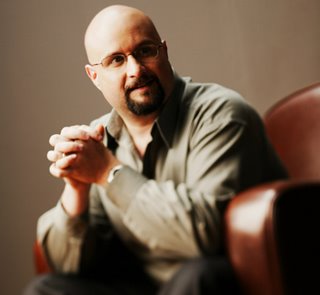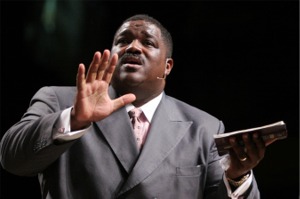The Emerging Church
Scot McKnight recently addressed Westminister Theological Seminary concerning about the Emerging Church, asking this question: "What is the Emerging Church (pdf link)?" Basically, his premise is that it is best to allow the emerging church/movement/thinkers to speak for themselves in defining what the movement/conversation is or isn't. He is particularly critical of D.A. Carson whose book Becoming Conversant with the Emerging Church essentially narrows the discussion about the emerging church to one person (Brian McLaren, perhaps the most visible of emerging thinkers in the United States) and one issue (postmodern epistemology). McKnight's critique of Carson's book is valid because the emerging movement is not represented well by McLaren alone, nor is it simply a movement defined by its epistemology, or as emerging thinkers probably would argue and agree, lack of concrete epistemology.
McKnight's address is long (30 pages but worth the read), so let me take some time to address a few of the prominent issues in the article.
Concerning theology or theological definitions... "To force the emerging movement into a theological definition is to do violence to it - it isn't a theological movement and so can't be defined that way." This is precisely the problem that many conservative evangelicals have with the emerging, postmodern approach to epistemology, mission and ecclesiology. The emerging church attempts to avoid theological statments about God because postmodern epistemology does not allow for absolute truth statements about anything since it is impossible to know anything with absolute certainty. But in seeking to avoid making theological statements about God, it fails to recognize that the "conversation" cannot avoid speaking theologically about God, not matter how one tries to dance around the issues. The funny thing is that McKnight, who has openly aligned himself with the emerging church, later states that "every movement is theological in one way or another, and that means the emerging movement is a theological movement." But within this admission McKnight concedes that there really are no boundaries or parameters to emerging theology, stating that it is "best to see it as a conversation about theology, with all kinds of theologies representeed, with a core adhering to the classical creeds in a new key." Of course, the danger to this is that if there are no clear propositions about God revealed in Scripture that we can hold to as Truth, then we indiscriminantly widen the gates for entrance into the Kindgom, gates leading to a path Jesus Himself said was quite narrow. This, of course, is not a problem for the emerging church because they make no attempt to determine who "belongs" to the Kingdom because they are skeptical of our ability to know such things. While I would agree with this statement to the degree that it is impossible for us to discern the motives and intentions of a person's heart, thus making it impossible for us to know with certainty who the sons and daughters of God really are, it is not impossible for us to speak with confidence about a person's confession of Jesus if the evidence of their faith is in line with the Christian ethic defined by Scripture.
Concerning the Penal Substitutionary Death of Jesus...McKnight points out that one critical flaw of D.A. Carson's book about the emerging church is that he names Brian McLaren and Steve Chalke as one of the most influential leaders of the emerging movement in the US and Britian respectively. Chalke has famously equated penal substitition with divine child abuse, and thus, by identifying him with the emerging movement, some are now saying that the entire movement sees the atonement as Chalke does, and thus denies the necessity of the penal substitution of Jesus. Chalke has openly denied being a part of the emerging church in the UK. I think you see the problem. Misinformation.
But what about Brian McLaren? He is the most visible public figure in the movement and his books Generous Orthodoxy and A New Kind of Christian have thrust the Emergent Village and emerging movement (which are two different things if you ask McKnight) into the religious spotlight. McLaren is a slick salesman and is gifted with the use of language (which is ironic considered the skepticism of McLaren's collegues about language - we'll get to that later). Does McLaren deny the penal substitutionary work of Jesus (meaning Jesus was satisfying God's wrath for our sin, something that is seemingly clear in Scripture) as necessary for salvation? McLaren has not outright denied penal substitution, but he has endorsed Alan Jones' book Reimagining Christianity as a work that "stimulates and encourages me deeply", a book that denies the penal substitutionary atonement of Jesus Christ. Jones writes: "Implicit in the cross that Jesus' sacrifice was to appease an angry God. Penal substitution was the name of this vile doctrine (168)." So McLaren may not have denied it publicly, but why endorse a book that does if you aren't at least sympathetic to the author's view?
The Suspicion of Language...LeRon Shults claims (and McKnight believes he is right) "from a theological perspective, this fixation with propositions can easiliy lead to the attempt to use the finite tool of language on an absolute Presence that transcends and embraces all finite reality. Languages are culturally constructed symbol systems that enable humans to communicate by designating one finite reality in distinction from another. The truly infinite God of Christian faith is beyond all our linguistic grasping, as all the graet theologians from Irenaeus to Calvin have insisted, and so the struggle to capture God in our finite propositional structures is nothing short of linguistic idolatry." While is is true that we struggle to capture God with our finite propositional structures, this should not make us paranoid in our suspicion of the inadequacies language, or fearful of revealed propositions described by language, albiet imperfectly.
The spiritual reality about language is that language is unquestionably one of the primary ways in which God has revealed Himself to us (John 1:1-4, 14). Knowledge is imparted through language. Language, God speaking to man through His own voice, Jesus, angels, prophets, and Scripture is the means of His revelation. John Piper said, "Jesus is honored by us knowing and treasuring who He is, not who we aren't sure He is." The emerging church says the joy is in the journey. The journey is a veiled mystery. But the mystery is not in what we do not know, but that there is infinitely more to know about God (Eph 2:7).
All in all the article is interesting, particularly if you want a better perspective on the emerging church and what all the hoop-la is about.






